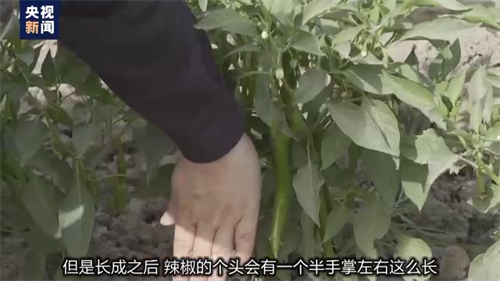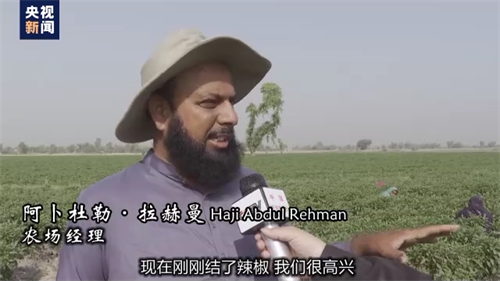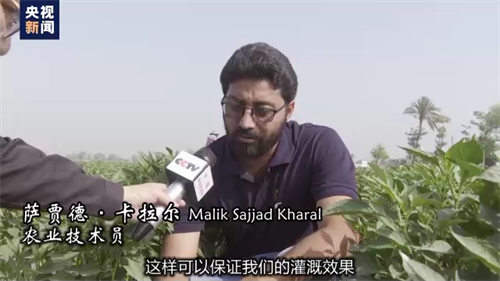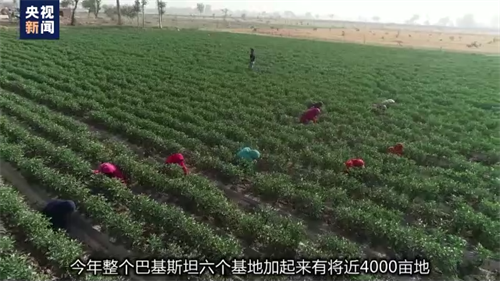With Sinomach's help, Pakistan sees spicy prospects in chili
(sinomach.com.cn)
2022-05-06Cooperation in the China-Pakistan Economic Corridor (CPEC) has entered the second phase, which is focused on industry and agriculture among other sectors.
The CPEC is a flagship project under the Belt and Road Initiative (BRI) and its launch in 2015 was regarded as a landmark event in the history of the Sino-Pakistani relationship. The CPEC will not only benefit China and Pakistan but also further enhance regional connectivity.
Apart from the framework of the CPEC, the two countries encourage their private business communities to form business-to-business connections with each other, and the project for contracting of chili farming undertaken by Sinomach subsidiary China Machinery Engineering Corporation (CMEC) is one example of such cooperation.
Influential media outlets in China including People's Daily have published stories highlighting the chili contract farming project, which is a part of the China-Pakistan Agricultural Cooperation Pilot Zone and a concrete action taken to heat up Pakistan's chili industry.
The China Media Group (CMG), a key national media organization, has recently explored the new progress of the CMEC chili contract farming project.
The first bilateral agricultural industry cooperation project -- the China-Pakistan Agricultural Cooperation Pilot Zone -- is in Multan, Pakistan's seventh largest city and the major cultural and economic center of southern Punjab province. The chilies in the fields have started to bear fruit. Now roughly the length of fingers, they will be longer than a hand when fully grown.

The young fruit is only about the length of a finger, but when ripe it can be longer than a hand. [Photo/screenshot of CMG report]
Farm manager Haji Abdul Rehman said that he never thought the Chinese would bring in a system that would make this field a great place to grow chilies.
"It's a very good farming system," Rehman said. "It's so nice to have chilies here. The varieties of chilies that the Chinese have brought are particularly good."
Farm managers are supposed to be on the farm around the clock while workers work about eight hours a day to care for the chili fields.

During the on-the-spot interview, Haji Abdul Rehman, a farm manager, said that there are well-grown chilies in the fields and everyone appreciates the farming system brought by the Chinese. [Photo/screenshot of CMG report]
Now that fruits have appeared in the chili fields and are growing well, they will bring considerable revenue to locals, according to the farm manager.
Malik Sajjad Kharal is an agricultural technician at the agricultural cooperation pilot zone. He said that compared with traditional local planting methods, China's precision farming technology has both increased pepper production and facilitated manual and mechanical operations, and the application of a waterproof layer also reduces the needed amount of irrigation.
Chilies make the land more profitable than traditional crops, Kharal said, adding that the fruitful bilateral cooperation in technical instruction and field management are satisfactory.

Farm agricultural technician Malik Sajjad Kharal introduces the planting techniques taught by Chinese experts. [Photo/screenshot of CMG report]
Kharal said they planted the trees according to the requirements of the Chinese experts, keeping the ridge height at eight to nine inches to ensure the irrigation effect. In line with the planting methods, they also kept the plants 9.7 inches apart to allow the stems to grow and develop and make it easier to use tractors for mechanized plowing.
An uncertain period of seedling development and transplanting is past, and the plants are now in flower and bearing fruit, which signifies that Chinese varieties of chili seedlings are perfectly adapted to the local environment.

This year the six bases in Pakistan have a combined area of nearly 4,000 mu (2.67 square kilometers). [Photo/screenshot of CMG report]
Multan is one of six chili cooperative demonstration bases under the CMEC in Pakistan. Dai Bao, CMEC deputy general manager for Pakistan, said Pakistan has a good environment, soil and water, and cheap labor whereas China has good seeds and technology. "We will transfer this technology and seeds to Pakistan to improve the quality and yield of Pakistani crops."
"In the first phase, we are providing seeds and technology to farmers and companies and will buy back the whole crop upon its harvest. In the second phase, we will set up a factory for value addition and make the chilies available in the local market. In the third phase, we will focus on the global markets," he said.
He said Pakistan will get a huge benefit from the project because the country is focusing on increasing its exports, and through this cooperation, Pakistan's agricultural output will increase and exports will also be enhanced after the chili quality has improved.
The CMEC aims to build chili bases of 300,000 mu (200 square kilometers) in Pakistan and develop a chili deep-processing industry to generate more economic and social benefits and employment opportunities to the country.
Chili powder is widely used in almost all households in Pakistan, and the spice is used in almost all main courses in local food. But due to production shortages, chili powder costs more than other spices in the market.
Local officials believe that apart from uplifting small farmers, the enhancement in supply of good-quality chili will help improve the quality of the spice in local markets.
Chinese technology and Chinese chili varieties are very suitable for Pakistan and they are confident of a bumper harvest, Dai noted.

Farm agricultural technician Malik Sajjad Kharal said that the project will benefit Pakistani farm workers and contribute to the development of Pakistan's economy, which will bring the Pakistan-China partnership to a higher level. [Photo/screenshot of CMG report]

 R&D and Manufacture
R&D and Manufacture Project Contracting
Project Contracting Trade and Services
Trade and Services




